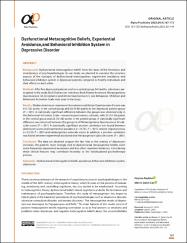| dc.contributor.author | Baykan, Hayriye | |
| dc.contributor.author | Can, Merve Şahin | |
| dc.date.accessioned | 2024-05-29T05:35:01Z | |
| dc.date.available | 2024-05-29T05:35:01Z | |
| dc.date.issued | 2023 | en_US |
| dc.identifier.issn | 2757-8038 | |
| dc.identifier.uri | https://doi.org/10.5152/alphapsychiatry.2023.231144 | |
| dc.identifier.uri | https://hdl.handle.net/20.500.12462/14749 | |
| dc.description.abstract | Background: Dysfunctional metacognitive beliefs form the basis of the formation and maintenance of psychopathologies. In our study, we planned to examine the common aspects of the concepts of dysfunctional metacognition, experiential avoidance, and behavioral inhibition system in depressed patients compared to healthy individuals and their effects on each other.
Methods: Fifty-five depressed patients and as a control group 54 healthy volunteers participated in the study. Beck Depression Inventory, Beck Anxiety Inventory, Metacognitions Questionnaire 30, Acceptance and Action Questionnaire II, and Behavioral Inhibition and Behavioral Activation Scale were used in the study.
Results: Median (minimum-maximum) Acceptance and Action Questionnaire II score was 9 (7-35) points in the control group and 30 (9-46) points in the depressed patient group (P <.001). A statistically significant difference between the groups was observed only in the Behavioral Activation Scale-reward responsiveness subscale, with 20 (14-30) points in the control group and 23 (13-36) points in the patient group. A statistically significant difference was observed between the groups in all Metacognitions Questionnaire 30 subscale scores (P <.001). A statistically significant positive correlation was found between depression scores and experiential avoidance (r = 0.751; P <.001), reward responsiveness (r = 0.329; P <.001) and metacognition subscale scores. In addition, a positive correlation was found between experiential avoidance and metacognition subscale scores (P <.001).
Conclusion: The data we obtained support the fact that as the severity of depression increases, the patients more strongly stick to dysfunctional metacognitive beliefs, exert more frequently experiential avoidance and less often impulsive behaviors. Considering these clinical features may contribute favorably to the individualized psychotherapy process. | en_US |
| dc.language.iso | eng | en_US |
| dc.publisher | Aves | en_US |
| dc.relation.isversionof | 10.5152/alphapsychiatry.2023.231144 | en_US |
| dc.rights | info:eu-repo/semantics/openAccess | en_US |
| dc.rights.uri | http://creativecommons.org/licenses/by-nc/3.0/us/ | * |
| dc.subject | Dysfunctional Metacognitive Beliefs | en_US |
| dc.subject | Avoidance | en_US |
| dc.subject | Behavioral İnhibition System | en_US |
| dc.subject | Depression | en_US |
| dc.title | Dysfunctional metacognitive beliefs, experiential avoidance and behavioral inhibition system in depressive disorder | en_US |
| dc.type | article | en_US |
| dc.relation.journal | Alpha Psychiatry | en_US |
| dc.contributor.department | Tıp Fakültesi | en_US |
| dc.contributor.authorID | 0000-0002-3288-2269 | en_US |
| dc.contributor.authorID | 0000-0002-4985-5689 | en_US |
| dc.identifier.volume | 24 | en_US |
| dc.identifier.issue | 4 | en_US |
| dc.identifier.startpage | 167 | en_US |
| dc.identifier.endpage | 173 | en_US |
| dc.relation.publicationcategory | Makale - Uluslararası Hakemli Dergi - Kurum Öğretim Elemanı | en_US |




















